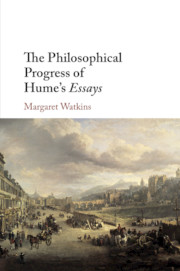Book contents
- The Philosophical Progress of Hume’s Essays
- The Philosophical Progress of Hume’s Essays
- Copyright page
- Contents
- Acknowledgments
- Abbreviations
- Introduction
- Chapter 1 Governing
- Chapter 2 Domineering
- Chapter 3 Working
- Chapter 4 Composing
- Chapter 5 Self-Loving
- Chapter 6 Loving
- Chapter 7 Thinking
- Conclusion
- Bibliography
- Index
Chapter 4 - Composing
Published online by Cambridge University Press: 14 December 2018
- The Philosophical Progress of Hume’s Essays
- The Philosophical Progress of Hume’s Essays
- Copyright page
- Contents
- Acknowledgments
- Abbreviations
- Introduction
- Chapter 1 Governing
- Chapter 2 Domineering
- Chapter 3 Working
- Chapter 4 Composing
- Chapter 5 Self-Loving
- Chapter 6 Loving
- Chapter 7 Thinking
- Conclusion
- Bibliography
- Index
Summary
- Type
- Chapter
- Information
- The Philosophical Progress of Hume's Essays , pp. 109 - 160Publisher: Cambridge University PressPrint publication year: 2019



